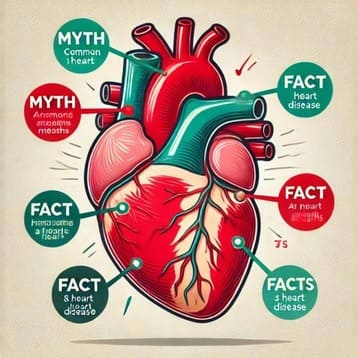Myths About Heart Disease: Misconceptions Debunked!

Introduction
Heart disease remains a leading cause of illness worldwide, yet so many myths about heart disease continue to circulate. From the belief that only older adults need to worry to the misconception that only men are affected, these myths can lead to dangerous assumptions and risky choices. With heart health information constantly evolving, it’s critical to set the record straight. Let’s dive into the top 5 myths about heart disease and reveal the facts, empowering you to make better choices for your well-being.
Myth #1: Heart Disease Only Affects Older People
While it’s true that heart disease risk increases with age, younger people are far from immune. Today, heart disease cases among those in their 20s, 30s, and even teens are on the rise. Research shows that lifestyle factors, genetics, and even stress can make younger people vulnerable to heart conditions. Overeating, lack of exercise, smoking, and high-stress jobs are just some reasons younger generations are at risk.
Fact check: Around 10% of all heart disease cases occur in people under 45.
Hidden risks: Obesity, high cholesterol, and undiagnosed high blood pressure are commonly found in younger people today.
Prevention tip: Start building heart-healthy habits early to minimize risks in the long term. This includes regular exercise, balanced nutrition, and limiting alcohol intake.
Myth #2: Heart Disease is a “Man’s Disease”
A huge myth about heart disease is that it mainly affects men. However, heart disease is actually the leading cause of death among women, and many don’t realize they’re at risk. Women’s symptoms can also differ from men’s, often appearing as indigestion, back pain, or fatigue, making heart issues harder to detect.
Fact check: Women are just as likely as men to suffer from heart disease, especially after menopause.
Unique symptoms: Women are more likely to experience non-typical symptoms, like nausea, shortness of breath, and jaw pain.
Prevention tip: Women should prioritize heart health by staying active, managing stress, and getting regular checkups.
Myth #3: If You’re Fit and Active, You Don’t Need to Worry About Heart Disease
Being fit and active is great, but it doesn’t make you immune to heart disease. While physical activity lowers some risks, it doesn’t erase genetic predispositions or the effects of a poor diet, high stress, or smoking. Many athletes and active individuals have suffered heart issues despite their physical fitness.
Fact check: Up to 30% of heart disease cases occur in people who appear healthy.
Hidden risks: High blood pressure, high cholesterol, and family history can increase heart risks, regardless of fitness.
Prevention tip: Regular heart screenings are essential even if you’re active; checking your cholesterol, blood pressure, and stress levels can be lifesaving.
Myth #4: Heart Disease Symptoms Are Always Obvious
A common myth about heart disease is that symptoms are always clear and dramatic. In reality, many people experience subtle signs or even no symptoms at all. Conditions like high blood pressure and early-stage artery blockages are often “silent” until a major issue occurs.
Fact check: Nearly 45% of heart attacks happen with no prior symptoms.
Hidden symptoms: Symptoms can range from jaw pain to feeling unusually tired, which many ignore as everyday stress.
Prevention tip: Recognize the subtle signs like shortness of breath, chest discomfort, and excessive fatigue. Being aware and proactive can prevent a major event.
Myth #5: Heart Disease Can’t Be Prevented if It Runs in the Family
Many people believe that if heart disease runs in their family, it’s inevitable for them. While genetics do play a role, lifestyle choices have a significant impact. In fact, a healthy lifestyle can reduce heart disease risk by up to 80% even if there’s a genetic predisposition.
Fact check: Genetics don’t guarantee heart disease; they simply increase the likelihood.
Preventive actions: Diet, exercise, stress management, and regular health screenings can dramatically reduce risk.
Prevention tip: Even with a family history, focusing on a balanced lifestyle and regular checkups can help manage risks.
Conclusion
The myths about heart disease have persisted for years, often standing in the way of a better understanding of this critical health issue. By debunking these myths, you’re already taking a powerful step towards better heart health. Let’s spread the truth, encourage open conversations about heart health, and stay informed so we can protect ourselves and our loved ones. Take charge of your heart health today—because knowledge, paired with action, is your best defense!



One thought on “Myths About Heart Disease: Misconceptions Debunked!”